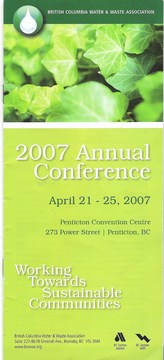Working Towards Sustainable Communities: Green Infrastructure Partnership and Water Sustainability Committee Collaborate at 2007 BCWWA Annual Conference
Collaboration
The Green Infrastructure Partnership (GIP) and the BCWWA Water Sustainability Committee (WSC) have developed a close working relationship, in part because the WSC is a member of the Partnership Steering Committee. The WSC also serves as the managing partner for the GIP. At the Annual Conference of the BC Water & Waste Association (BCWWA) in Penticton in April, the two groups collaborated to organize a half-day session on Convening for Action in British Columbia.
Sharing a Vision
 “The WSC and Green Infrastructure Partnership collaborated to organize the Action Plan session because desired outcomes for water sustainability and green infrastructure are common to both, and can be achieved through infrastructure standards that reflect a full and proper understanding of the relationship between land and water”, noted Kim Stephens (Program Coordinator for the Water Sustainability Action Plan for British Columbia), the Moderator for the Convening for Action half-day program.
“The WSC and Green Infrastructure Partnership collaborated to organize the Action Plan session because desired outcomes for water sustainability and green infrastructure are common to both, and can be achieved through infrastructure standards that reflect a full and proper understanding of the relationship between land and water”, noted Kim Stephens (Program Coordinator for the Water Sustainability Action Plan for British Columbia), the Moderator for the Convening for Action half-day program.
 “The British Columbia landscape is being transformed by settlement and economic growth. While the province has been experiencing enhanced social and economic well-being, the need to mitigate pressures on land and water resources has provided a driver for a ‘green infrastructure’ movement that is water-centric and is founded on a natural systems approach,” stated Paul Ham.
“The British Columbia landscape is being transformed by settlement and economic growth. While the province has been experiencing enhanced social and economic well-being, the need to mitigate pressures on land and water resources has provided a driver for a ‘green infrastructure’ movement that is water-centric and is founded on a natural systems approach,” stated Paul Ham.
To Learn More:
The session comprised five cascading presentations.and attracted an audience totalling 130. For a comprehensive story that provides a synopsis of each presentation, click on 2007 BCWWA Annual Conference Theme: Working Towards Sustainable Communities
Convening for Action in British Columbia
“Infrastructure design is changing. Cumulative benefits are achievable, one property at a time, through changes in the policies, programs, practices and standards that determine how land is developed and water is used. By implementing design with nature infrastructure practices and regulation, the ‘convening for action’ vision is that British Columbia will be well on the way to achieving water sustainability by 2010,” explained Kim Stephens.
practices and regulation, the ‘convening for action’ vision is that British Columbia will be well on the way to achieving water sustainability by 2010,” explained Kim Stephens.
In his prepared remarks delivered at the opening ceremony, Minister of Environment Barry Penner singled out the accomplishments of the Water Sustainability Committee in delivering the Water Sustainability Action Plan for British Columbia through partnerships with his Ministry, the Green Infrastructure Partnership and others. The Minister made the following observation: “Under the umbrella of the Water Sustainability Action Plan, the BCWWA through the Water Sustainability Committee has established the Water Bucket website, a resource-rich, interactive location for information about water sustainability in British Columbia. In addition, Convening for Action pilot programs in the South Okanagan, Vancouver Island and Greater Vancouver are promoting water-centric approaches to community planning and land development.”



